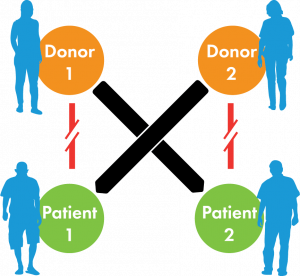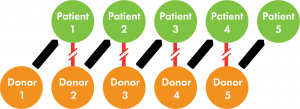Finding a living donor
What to do if you find a donor
If a donor comes forward:
- Decide whether you’re comfortable letting this person donate for you.
- Give them the transplant center’s phone number, so they can make an appointment to begin testing and interviews. The OPTN Patient Services telephone line is not connected to your transplant center, and due to privacy laws, we can’t look up your patient information and forward it to your transplant center.
- If multiple people offer, have all of them call the transplant center because it’s best to have more options in case 1 donor isn’t a good match
The center will talk with possible donors privately before they begin testing and interviews to make sure:
- They understand living donation
- They don’t feel pressured to donate
What if my donor lives in another state?
Your donor may be able to get tested closer to their home. Call OPTN Patient Services at 888-894-6361 to get this process started.
The transplant center will do many medical tests on your donor. The center will only let your donor donate if they don’t face major medical, mental, or financial risks from donating.
What if I have a donor, but they aren’t a match or aren’t a great match?
You may find someone willing to donate who isn’t a good match for you. This means there’s a strong chance your body will reject their donated kidney.
There are some options you can do to make transplant more likely to work well for you. These options are called desensitization and paired and chain donations.
Desensitization
About 1 in 3 kidney patients have extra antibodies that will attack almost any transplanted kidney. Antibodies are proteins in your blood that help your body fight disease. This can make it very hard or impossible to get a kidney transplant from a donor. A procedure called desensitization may help.
In desensitization, you get a blood treatment that takes out your antibodies and replaces them with new ones. The treatment is similar to hemodialysis. Your body will make new antibodies over time, and these new antibodies are less likely to attack a donor kidney. You may also get medicine to stop the unwanted antibodies from coming back.
You may need treatments both before and after your transplant. It may take several weeks of treatments before you’re ready for a transplant, or you may be ready after just 1 treatment. It only lasts for a short time, so usually you can only use this procedure if you have a living donor.
Desensitization may not be available in all transplant centers and it can be very costly. Talk to your team about if this is an option for you or if they can recommend a center that offers this treatment.
Paired and chain donations
But there are still options! If your potential donor is a poor match, you have these 3 options:
Paired exchanges

This is when 2 or more donor-recipient pairs who are not good matches, trade donors. This way each recipient gets a kidney that matches well with them. For example:
- You have 2 kidney patients who need transplants: Mr. Jones and Mr. Smith.
- Each patient’s son wants to give him a transplant, but neither is a match for their father.
- The transplant center suggests they do a paired exchange: Mr. Smith’s son donates to Mr. Jones, and Mr. Jones’s son donates to Mr. Smith
- The exchange lets each kidney patient get a matched kidney, while also allowing each son to help his father get a transplant.
Compatible pairs donation
This is when 2 or more donor-recipient pairs match, but not as well as a doctor might like them to. It works just like a paired exchange, but if it takes too long to find another donor-recipient pair, the donor can still give to their recipient.
Living donor chains
This is similar to a paired exchange, but involves more people. For example:
- You have 3 kidney patients who need transplants: Mr. Jones, Mr. Smith, and Mr. Doe.
- Each patient’s wife wants to give him a transplant, but none of them are a match for their husband.
- The transplant center suggests that they create a donor chain: Mrs. Jones donates a kidney to Mr. Smith, Mrs. Smith donates a kidney to Mr. Doe, and Mrs. Doe donates a kidney to Mr. Jones
- The chain lets each kidney patient get a matched kidney, while also allowing each wife to help her husband get a transplant.

Some chains have included over 30 patient and 30 recipients!
Paired donations
Watch this video.
Compatible pair donations
Watch this video.
Who can do a paired or chain donation?
For kidney patients
You must have a living donor who can donate, but who doesn’t match you
For donors
You must agree to take part in a paired donation
Non-directed donors
Sometimes, people step forward to donate a kidney to someone they don’t know. A non-directed donor can help build a donor chain or a paired donation that wouldn’t be possible without them.
What happens if a paired match is found?
- When a match is found, the transplant center contacts both the kidney patients and the potential donors
- The center does tests to make sure the donors and kidney patients match
- Then, all kidney patients and donors must agree to the paired donation
Even if tests find a possible match, there is no guarantee that the transplant will happen.
Where does the paired or chain transplant take place?
For kidney patients
You will likely have surgery at your transplant center. However, you may choose to travel to another transplant center if the donor is unable or unwilling to travel. Your transplant center will discuss the risks of shipping a kidney
with you and ask if you want to accept a shipped kidney. Before you are paired, the matching system will take note of if you’re willing to travel.
For donors
Your surgery will likely happen at the center where you did your testing. Transplant professionals will ship your kidney to the kidney patient’s center. Some patients may ask you to consider traveling to their center for the surgery to lower the chance of something going wrong while shipping the kidney. Before you are paired, the matching system will take note of if you’re willing to travel.
Leaders in transplant excellence
UNOS works with leading educational partners to provide accurate, trustworthy health information. Our educational partners include:
Special thanks to our corporate sponsor for supporting excellence in transplant education:


